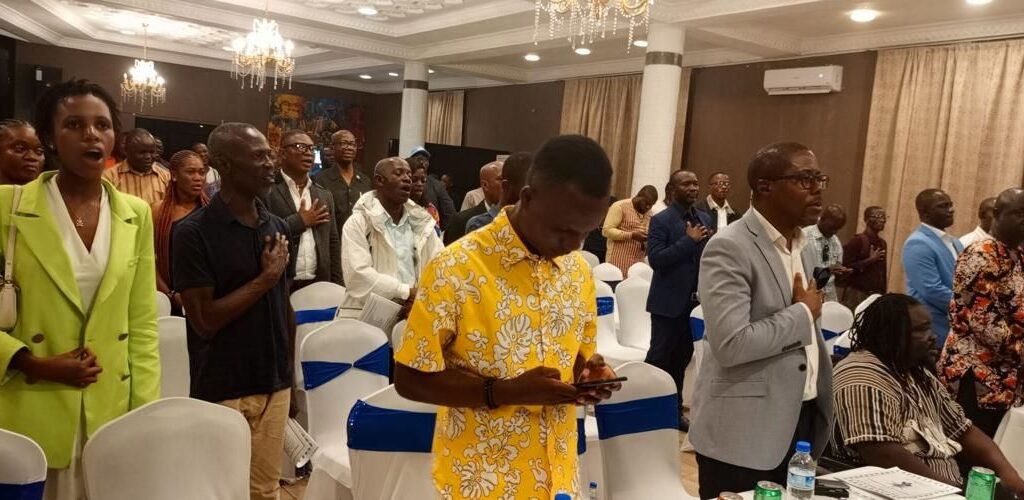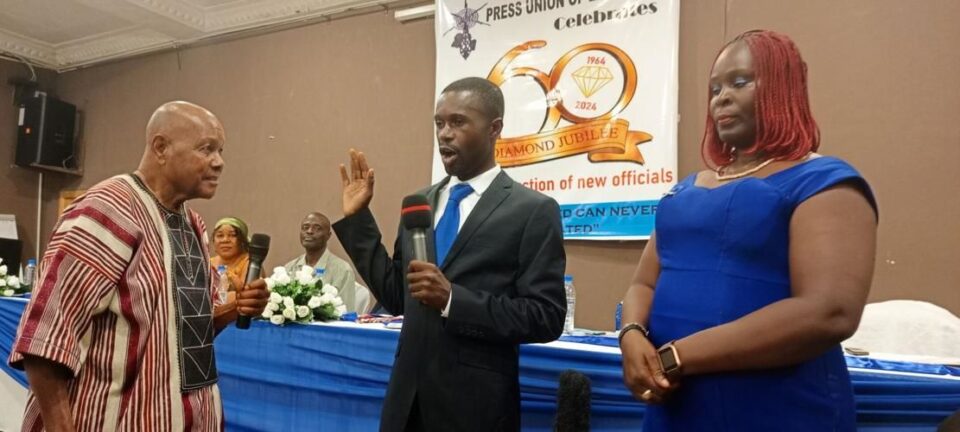Julius Kanubah takes helm of the union, pledges a new era of accountability and unity
PHOTO: Mr. Kenneth Y. Best, former President of the Press Union of Liberia inducting the PUL’s newly elected president, Julius Kanubah and vice president, Beatrice Sieh into office
Culled from Daily Observer Newspaper
In a landmark event marking the dawn of a new era for journalists in Liberia, the new leadership of the Press Union of Liberia, headed by Julius Kanubah, was inaugurated on Tuesday, October, 1, 2024 — a development that signals an end of a prolonged leadership crisis that engulfed the organization for nearly two years.
Speaking at the inaugural event, Kanubah emphasized the significance of this moment as a turning point for the PUL, which had been embroiled in disputes over its membership register, leaving the union without a democratically elected leadership since November 2022.
“This is a new era for the PUL,” Kanubah declared. “If anyone doubted the collective resolve of the membership to put an end to fraud and manipulation, they must rethink. The rule of law will always prevail over the rule of men and women.”
He firmly stated that the Union must never again endure such practices that led them through the country’s judicial system, from the Supreme Court to Lower Courts, exhausting even the Justices and Judges.
The crisis culminated in the intervention of the Ninth Judicial Circuit Court in Bong County, which ordered the establishment of an 11-member Interim Committee to oversee the rerun election.

Delivering his induction speech at the 60th anniversary and induction ceremony of the new elected officers of the Press Union of Liberia (PUL), held under the theme “A People United Can Never Be Defeated”, Kanubah expressed gratitude to the interim committee, chaired by former PUL President Peter Quaqua, for its commitment to upholding the Court’s mandate.
He praised the committee’s leadership, which included media veterans including Elizabeth Hoff, James Kiazolu, Malcolm Joseph, and Helen Nah-Sammie, for their impartiality and diligence during the union’s most challenging period.
With the election of Kanubah and his leadership team, including Vice President Beatrice T. Sieh, Secretary General Akoi Baysah, and Assistant Secretary General Julius Konton, the PUL has regained its democratic structure.
Kanubah underscored that the union is back for good, promising to protect, defend, and enforce the PUL Constitution while remaining honest and impartial. Reflecting on the current state of journalism in Liberia, Kanubah acknowledged the growth and expansion of media outlets since the end of the civil war.
However, he pointed to lingering challenges, particularly in maintaining ethical standards and ensuring responsible journalism. “While the media environment has improved, we must address the ongoing abuses of ethical journalism,” he said, highlighting the urgent need for more accountability within the media sector.
Kanubah also tackled the sensitive issue of media workers’ salaries, describing the current wages as “appalling”. He noted that many journalists and media workers are paid far below a livable wage, some earning as little as US$20 to US$30 monthly. “It is shameful that we, as a trade union, have overlooked this issue for so long,” he lamented. He vowed to prioritize improving the working conditions of journalists, linking fair compensation to enhanced productivity and ethical journalism.
Kanubah further criticized the increasing political interference in the management of community radio stations by county superintendents and called for immediate government action to protect the independence of these stations. He emphasized that political control over the media threatens press freedom and undermines the role of journalists in holding the government accountable.
Promising a leadership that serves all PUL members, Kanubah called for an end to the division that had fractured the union for two years. “There is no more Team Kanubah, Team Daniel, or Team Unity,” he stated. “Starting today, we are all Team PUL. It’s time to put aside our differences and make the Union stronger.” To this end, he announced plans to form a Special Committee tasked with reuniting the union’s membership, extending an olive branch to former PUL President Charles Coffey, former Vice President Daniel Nyankonah, and other former officials.
Outlining his agenda, Kanubah pledged to restore credibility, integrity, and dignity to the Union. Key priorities include accountable leadership, impartial advocacy, constructing the PUL headquarters, supporting women in journalism, and fostering inclusive media development. His administration plans to develop a SMART strategic plan with 31 action points to achieve these goals.
One of the major reforms Kanubah intends to introduce is conducting an audit of the Union’s past financial and operational activities, including transactions during the leadership crisis. “We will take necessary actions, including legal measures, where appropriate, to ensure accountability,” he assured members.
Kanubah also announced plans to initiate a comprehensive review of the PUL Constitution, with a focus on membership categories and the eligibility criteria for full, associate, and affiliate membership. This review will also address the issue of PUL members transitioning into politics, as highlighted by the Interim Committee’s handling of political affiliations.
As he concluded his speech, Kanubah turned his attention to the national landscape, criticizing the Boakai administration for what he termed as a “rescue mission gone wrong.”
He expressed concern over the perennial culture of “come, grab, and go” within the government and urged the administration to prioritize accountability, transparency, and the creation of a war and economic crimes court.
Kanubah pledged that the PUL, under his leadership, would maintain its role as a moral voice in society, constructively engaging the government while holding it accountable. “We will not shy away from being critical where necessary,” he stated.
With an ambitious agenda and a call for unity, Julius Kanubah’s leadership promises a renewed commitment to the values of responsible journalism, ethical leadership, and an inclusive, forward-thinking Press Union of Liberia.
“The PUL is back, and back for good,” he concluded to resounding applause, signaling the beginning of what he hopes will be a new and progressive chapter in the union’s history.
Meanwhile, Mr. Kenneth Y. Best, the 8th President of the Press Union of Liberia and co-founder of the Liberian Observer Corporation (LOC), publishers of the Daily Observer newspaper, served as the induction officer at the event. In brief remarks ahead of the induction, Best urged the incoming PUL officials, as well as all journalists, to aspire to levels of excellence deserving of the public trust.
At the induction, only two of the four elected officials stood to be inducted — president-elect Kanubah and vice president-elect Sieh. The other two individuals, Akoi Baysah, Secretary General-elect and Julius Konton, Assistant Secretary General-elect, were conspicuously absent.
Also conspicuously absent from the PUL event was the Ambassador of the ECOWAS Commission to Liberia, Madam Josephine Nkrumah, who had previously agreed to deliver the keynote address at the PUL’s. According to the organizers, Nkrumah expressed concerns that her appearance would create the impression that she favored one side of the apparent divisions in the PUL that have lingered as a result of the 2022 disputed election, which landed the Union in court.
While there was no indication that Baysah and Konton made known their reasons for not showing up for induction, Peter Quaqua, the Convener and head of the Interim Committee of the Press Union of Liberia (PUL), declared that those positions whose officers-elect did not show up to be inducted would be declared vacant.
In his prepared remarks resounding with resolute optimism, Quaqua described their gathering as a celebration of a truly remarkable milestone in the Union’s history. highlighted that the PUL’s 60 years of dedicated service to Liberia stand as a testament to the Union’s enduring spirit and the steadfast commitment of those who have shaped its legacy.
“This diamond jubilee is proof of the PUL’s resilience as an organization,” Quaqua noted. “For six decades, we have been at the forefront of advocating for press freedom and free speech, demonstrating the unwavering resolve of those who have carried the torch of journalistic integrity in Liberia.”
Quaqua recounted the founding of the PUL, established by a handful of journalists in response to repressive actions taken by the government at the time. He emphasized the significant moment when journalist Stanton Peabody was jailed for writing an article critical of the legislature, branding lawmakers as radicals. “His arrest had a chilling effect,” Quaqua said. “But it also mobilized his colleagues into action, uniting them in a shared cause that would ultimately lead to the creation of the PUL.”
Reflecting on the Union’s six-decade journey, Quaqua highlighted the PUL’s “resilient progress” and “unwavering commitment” to the core principles of press freedom. “Since its founding in 1964, the PUL has been a tireless advocate for the rights of journalists, promoting ethical journalism and ensuring that the voice of the Liberian people is heard,” he remarked.
Acknowledging the challenges faced throughout its history, Quaqua paid tribute to the countless individuals who have contributed to the Union’s success. “Tonight, we honor those who have made the PUL what it is today — from our founding fathers to the current generation of journalists and members. Each has played a vital role in shaping this organization,” he said. “Their dedication and passion have been the backbone of the PUL’s achievements.”
However, Quaqua also reminded the audience that the PUL continues to face significant internal and external challenges. Economic constraints and limited financial stability, he noted, have caused some journalists to compromise their ethical integrity. “The rise of disinformation and the erosion of trust in the media are hurdles we must overcome,” he warned.
He also underscored the increasing threats to the safety of journalists, with reports of harassment, intimidation, and violence against reporters, particularly those investigating corruption and governance issues.
As he concluded, Quaqua called for stronger legal protections for journalists and greater solidarity among media professionals. “The future looks promising, but only if we unite,” he urged. “We must prioritize continuous professional development for journalists, including ethical training and digital literacy, to maintain the integrity of our work and ensure that we uphold the standards that the PUL was founded upon.”
Quaqua’s message resonated deeply with the audience, reinforcing the significance of the Union’s legacy while acknowledging the work still ahead. As the PUL celebrates 60 years of service, its mission to safeguard press freedom and uphold journalistic integrity remains as critical as ever.

